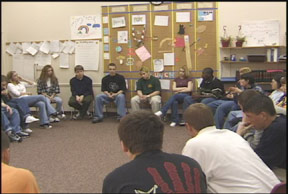Amplifying Rebecca Wigod's Fine Review
 Keywords: blame; criminal justice; restorative justice; recidivism; television dramas.
Keywords: blame; criminal justice; restorative justice; recidivism; television dramas.Rebecca Wigod did a swell job reviewing my book, Two Aspirins and a Comedy, in today’s (Saturday’s) Vancouver Sun. Not only was it a pleasant review, but also it was fair and accurate. Bless her.
Of course, there are always ideas that an author would like to add, even to the best of reviews, and this morning I have an opportunity to do so – at least here on my blog. Joy Kogawa and I returned to Toronto yesterday, and I’ve had a good sleep after my delightful one-month-long book tour. Now I can begin to catch up with my blogging.
The main point I’d like to add to Rebecca’s account of my book is the importance of television in shaping our culture. To be sure, it also reflects the culture, and can hardly be changed radically in directions that viewers are not ready to go. However, I do believe there are certain changes that could be introduced and accepted readily. In particular, I think audiences would be glad to shift away from this overemphasis on criminal justice and the habit of constantly apportioning blame. People want to be engrossed in stories, and the cheapest, simplest, and least intelligent way of holding their attention is to get them involved in the pursuit of wrongdoers. A bad guy commits a crime (usually a violent one) and must be captured and incarcerated or even exterminated. This repetitive formula evidently works as a theme of entertainment, for the most popular TV shows today rely on it consistently. But the public could become engaged in a different game just as readily — the apprehension of a wrongdoer, followed by an exploration, not just of the unfortunate history that led him into crime (we get quite a few of those stories already), but also the search for ways of restoring well-being to his victims and to himself, by inducing him to fulfill his appropriate role in society.
There have been whole periods of history and whole societies that lacked any formal system of criminal justice. Instead, the wise members of the community conferred among themselves and with the victim of a crime, and then confronted the perpetrator face-to-face, demanding that he acknowledge and make amends for the harm he had done. They meted out punishment, which might include restitution, and they held their ground until the wrongdoer was finally re-integrated into society as a reputable member. Native Canadian groups today have the legal right to use their traditional methods of restorative justice, which seems to be more effective in reducing recidivism than the usual formal legal approach. I know a woman lawyer who runs circles for youth in a Toronto district known for its roughness (see photo), and she swears that it helps the participants by giving them an opportunity to talk about their offences and their unmet needs. Similar processes could be demonstrated in television stories, pointing out possible solutions instead of simply glorifying the process of incarcerating wrongdoers, as if there were no further problems still awaiting society after their release from jail.
The whole focus on blaming is misplaced, or at least over-emphasized. There are more ways of getting thrills and excitement than just by assigning culpability for mistakes. The search for constructive solutions is plenty challenging, too, and it will benefit us all by making us recognize the humanity of those who make harmful mistakes. After all, we belong in that category ourselves, whether or not we have ever lost our jobs or custody of our children or our public reputation because of the dumb things we have all done. Not only more mercy is required in this society, but more wisdom too. And television can contribute to that wisdom. I hope to see a new social movement arise that will recognize the impact of television and call on scriptwriters and producers to stimulate a finer world by writing gripping, challenging, inspiring stories that suggest new solutions to old problems.



1 Comments:
I agree with your description of these shows. I just don't agree that they are the only possibilities. Not every society is hung up on catching wrongdoers. The American Indians, for example, had no jails. Anthropologists and archaeologists have never found evidence for one. So what did they do instead? Could we learn from them? I think maybe so.
Post a Comment
<< Home